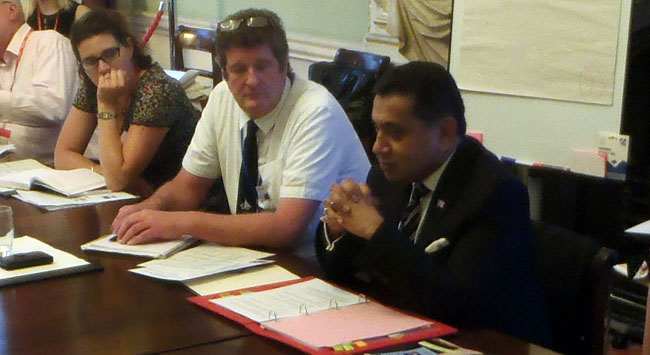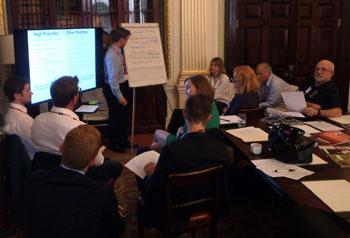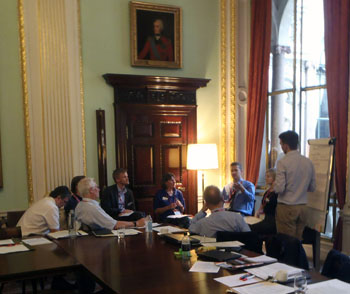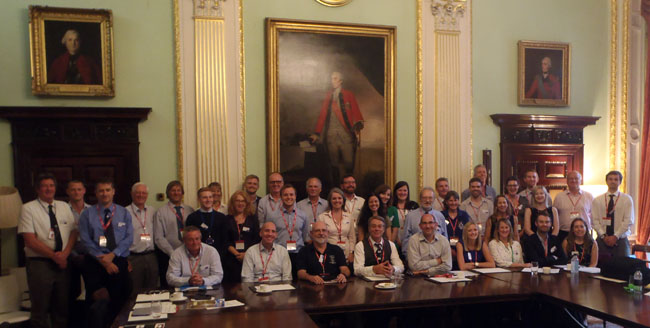Key Stakeholders meet to discuss Tristan's Blue Belt Commitment
Report by Tristan Administrator Sean Burns
Key Stakeholders meet to discuss Tristan's Blue Belt Commitments
In 2015 the Tristan Government gave its commitment to implement a strategy to protect its marine environment by 2020. During 24th-27th July 2017 key stakeholders met to see how Tristan might achieve this.
What is the Blue Belt Programme?
To help the Overseas Territories meet this commitment, the UK Government has provided funding up to 2020 to the Marine Management Organisation (MMO) and the Centre for Environment, Fisheries and Aquaculture Science (CEFAS) to provide the expertise and advice the OTs might need to formulate and deliver the strategy.
Why have we signed up to this commitment?
Tristan is hugely (and rightly) proud of the way it has protected its marine environment and precious lobster fishery over the years. As the National Geographic Pristine Seas/RSPB expedition discovered during their visit earlier this year, the marine environment is pristine. This is not about a problem that needs fixing. This is all about having the plans in place to ensure we keep things this way for generations to come.
Delegates gathered in the India Office Council Chamber of the Foreign and Commonwealth Office
during the Workshop on Tristan da Cunha's Blue Belt Programme held on 27th July 2017
Participants
An important part of this process is to ensure that key stakeholders are consulted and have an opportunity to contribute to the strategy. The week started with a two day workshop on 24th and 25th July for scientists. This was kindly hosted by one of Tristan’s main partners, the RSPB. There were sea bird and penguin experts, mammal experts, marine, fishery and oceanographic scientists as well as those that will help deliver the programme. Tristan was represented by James Glass, Katrine Herian and me. This two day meeting helped focus minds on the one day workshop hosted by the Tristan Government at the Foreign and Commonwealth Office on Thursday where we were joined by a wider group including Chris Carnegy, Tristan Government UK Representative, Richard Grundy and John Cooper from the Tristan Association, representatives from the fishing company Oventones, Joint Nature Conservancy Committee (JNCC), South Atlantic Environmental Research Institute (SAERI), UK Overseas Territories Conservation Forum (UKOTCF), RSPB, British Antarctic Survey (BAS) National Geographic, as well as other scientists, UK government experts and officials. We were delighted that the Overseas Territories Minister Lord Ahmad was able to join us for part of the meeting to discuss the Bluebelt programme generally and how we intended to take this forward on Tristan.

UK Government Overseas Territories Minister Lord Ahmad (right)
addresses the workshop on 27th July.
Chairman Sean Burns is seated next to Lord Ahmad.
(Photos: Richard Grundy)
Outcomes
The purpose of the workshop was to identify what we already know about the marine environment and where we found gaps, ideas on how we might fill those gaps. This will ensure that any decisions Tristan makes about the strategy are evidence and science based. It was clear that we need to know much more about the biodiversity & ecology and state of the seamounts. This is key to Tristan formulating its strategy to diversify its economy and fishery and if it decides to do so, fishing on these seamounts in a sustainable way. As everyone knows, the Tristan economy is heavily reliant on its MSC (Marine Stewardship Council) certified lobster fishery. We want to use this as a benchmark.
What will the strategy look like?
There has been much talk of what kind of Marine Protected Area we will have. There are many options from a Category I (no take zone) to an IUCN Categpry VI (certain activities such as fishing allowed) and a range of options in between. We might designate different areas separately or we might simply manage this through licensing. This is not about drawing lines on maps and it will be some time before we decide on the designation(s). This is about having a plan in place that protects the marine environment for the future (and beyond 2020) and for the Tristan community and its sustainability. It will be the Tristan community, through the Tristan Government, that will decide.
 |
 |
| Two groups in session discussing options for next steps at the Blue Belt Workshop on 27th July. |
Other areas to look at
We will need to ensure we have a monitoring programme in place not only to monitor the science but to monitor illegal fishing. This will involve surveillance, patrols, training and updating legislation. We are also looking at designating the area a Particularly Sensitive Sea Area (PSSA) to keep the many ships we have passing through our waters away from the islands. We have the evidence that accidents do happen (wrecks of the Oil Rig in 2006 and the Oliva in 2011). We also need some tangible help on the island. We need to refurbish the fisheries patrol boat, we need a lab to conduct some of the science and research ourselves and we need to build capacity on the island. We need the resources to conduct inshore surveys (e.g. shark tagging) and other projects.
Next Steps
We need to move quickly to start looking at the threat of illegal fishing and how we might enforce controls. We need to look at the state of fishery stocks and the areas where we might fish in future. We also need to look at the state of the ocean generally (sea temperatures, salinity etc.) to establish if there are threats from e.g. climate change effects (rising sea levels, temperatures) and what, if any, impact that might have on the marine environment and our marine resources.
Thanks
I want to say a big thank you to all who have contributed to the programme so far and to all of those who attended the meetings this week. James Glass and I have a lot to take back to and discuss with the island. This is a really exciting programme and I look forward to helping deliver it by 2020. We will publish firther reports on the website.

